
James O'Brien 10am - 1pm
25 April 2023, 10:05 | Updated: 25 April 2023, 11:01
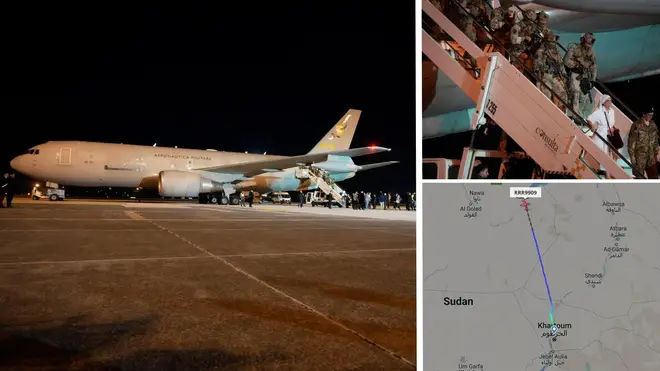
The first RAF flight to get Brits out of Sudan took off today during a fragile 72-hour ceasefire in the war-torn country.
It touched down at an airfield north of the capital early this morning and is set to arrive in Cyprus at around 2.30pm.
Flight tracking websites show the RAF plane - a Lockheed C-130 Hercules took off from the Akrotiri military base in Cyprus at around 7am. It later touched down at the airfield north of Khartoum before bringing the first batch of British nationals to safety - taking off at around 10am UK time.
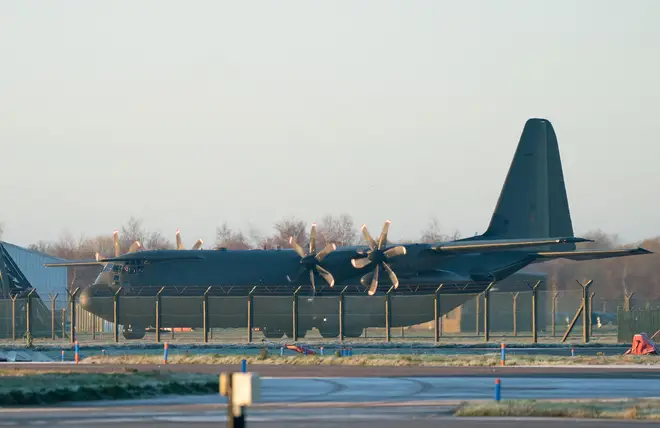
Brits with places on evacuation planes were being told to make their own way to the airfield.
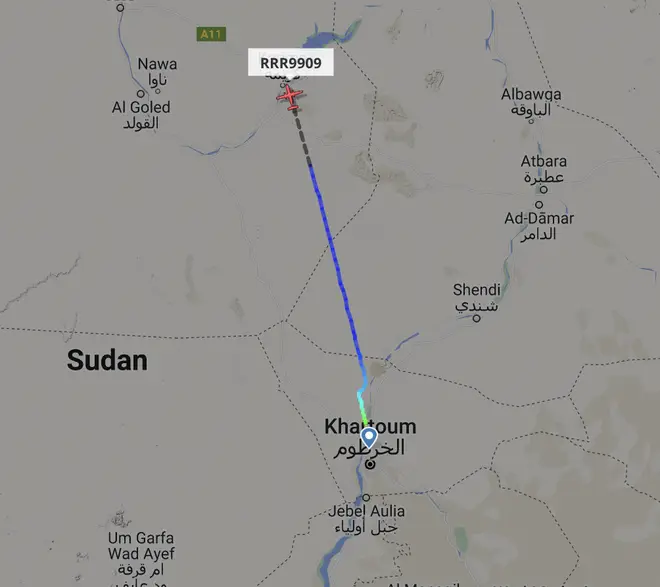
We are providing what assistance we can and we are operating as quickly as we can
Foreign Secretary James Cleverly said: "We will maintain this airhead for as long as we can but the situation does remain dangerous and volatile.
"This is an active conflict, the ceasefire has been announced but we know there have been pockets of violence even within previous ceasefires.
"So this does remain dangerous, this does remain difficult. We are providing what assistance we can and we are operating as quickly as we can."
I think people will have the evacuation from Kabul very firmly in mind. That's the last time we saw this sort of event. But Kabul was very different
Priority will be given to families with children and/or the elderly or individuals with medical conditions.
Mr Cleverly Tweeted this morning: “The UK Government is coordinating an evacuation of British nationals from Sudan. “We have started contacting nationals directly and providing routes for departure out of the country.”
Many stranded Brits face a three-day drive to safety as opposing sides agreed to a 72-hour ceasefire.
At least 2,000, and up to 4,000 Brits are thought to still be in country after Britain managed to get its diplomats out with special forces.
A military unit also arrived in Port Sudan, on the Red Sea, to scope it out for a possible evacuation, but that is a three day drive from the chaos in the capital, Khartoum.
Brits have been told to shelter in place while a plan to get them out safely, away from the violence of the brewing civil war, is put together.
There are believed to be 71 NHS doctors in the country, as Brits complained of feeling "abandoned" after the special mission to rescue the diplomats.
Armed Forces Minister James Heappey told LBC's Tonight with Andrew Marr: "I think people will have the evacuation from Kabul very firmly in mind. That's the last time we saw this sort of event. But Kabul was very different."
Asked if it was too dangerous to use British forces to get more people out at the moment, he said: "Yes. The danger is that other than the very tight and controlled mission that we did Saturday into Sunday to extract the diplomats over which we had a very tight degree of control.
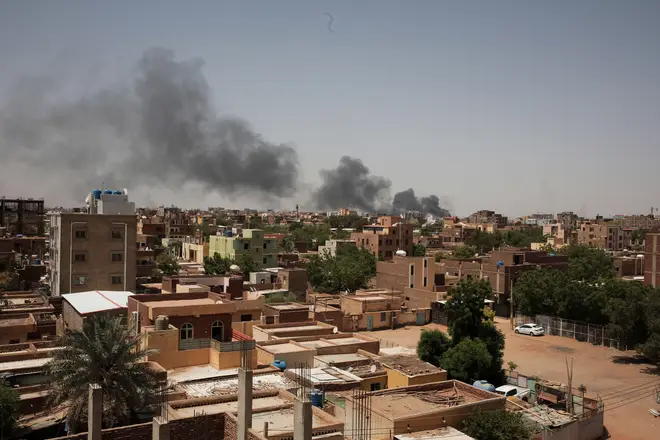
"Beyond that, we would effectively be inserting foreign troops, not just us there'll be other countries that would want to do it, into the parts of Khartoum that has been the most hotly fought over."
Rishi Sunak held a Cobra meeting on Monday but there was no publicly published plan to get people out.
The Royal Navy's RFA Cardigan Bay and HMS Lancaster could be sent to the coast to help with any evacuation. The former ship is in Bahrain, while HMS Lancaster in India.
Read more: Sudan factions agree 72-hour ceasefire as UK scrambles to get Brits out of deadly conflict
They could be used to add to the flights out of Sudan, where at least 400 people have died.
Our strong advice to British citizens is to stay indoors. It's extremely dangerous out on the streets of Khartoum.
But Andrew Mitchell, a foreign office minister, warned Brits to stay sheltered until they hear otherwise.
"Our strong advice to British citizens is to stay indoors. It's extremely dangerous out on the streets of Khartoum.
"If they wish to move because they have better information on the ground than we do in the Foreign Office then they may do so, but they do so at their own risk."
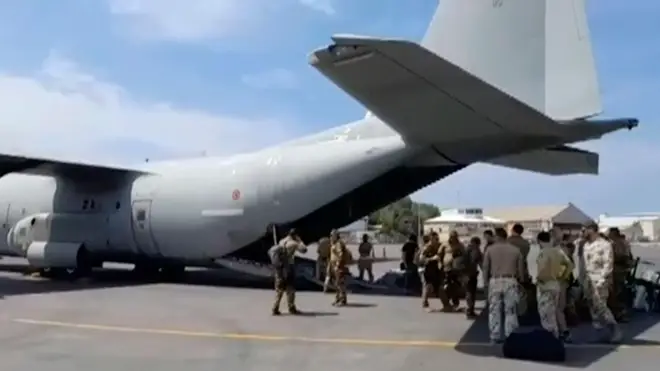
The danger was highlighted when a French special forces soldier was gravely "ill" after being shot during a rescue mission.
Sudan faces being torn apart in a fresh conflict, this time between the Sudanese Armed Forces and a massive, powerful militia called the Rapid Support Forces.
Deployed previously in the highly controversial Darfur conflict, and with ties to Russia and its notorious Wagner mercenary group, the RSF is fighting to avoid being absorbed into the regular military.
However, on Monday, US secretary of state Antony Blinken announced both sides had agreed to a 72-hour ceasefire.
There were questions about why the British ambassador, Giles Lever, was not in the country when the violence broke out.
He told the Mail at his London home that he had been working 20-hour days to help stranded Brits and denied the embassy had just been abandoned.
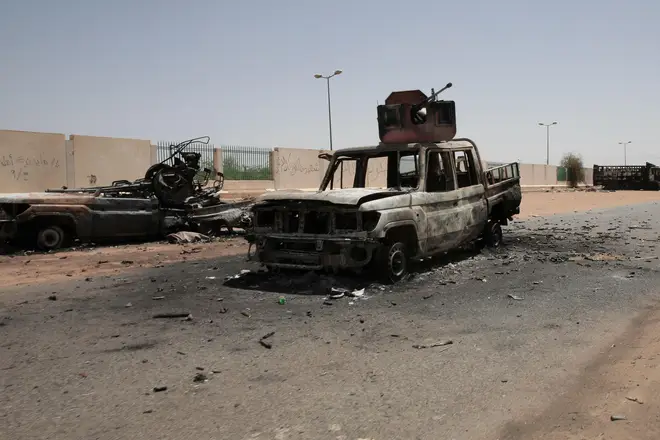
"I came back here for a scheduled holiday at Easter and have been unable to return. I had been working solidly on the problems in Sudan for three months before I left," he said.
"I hadn’t seen my wife at Christmas and my holiday was approved by my boss. But I cannot get back there.
"But it is incorrect to say that the embassy had been abandoned. There was a very senior diplomat, my deputy, in charge while I took leave."
Diplomats were taken out of the danger by a crack group of SAS, Royal Marines and RAF operators late on Saturday.
But there is still no clear strategy for getting thousands of UK passport holders out.

Armed Forces Minister on complexities of evacuation plans
There are reports of some rogue fighters raiding people's homes at random.
A British citizen, William, told the BBC he had to leave Khartoum on a bus his employer arranged because "we've had absolutely nothing but nonsense from the Government".
Iman Abugarga said she felt absolutely abandoned by ministers.
Writer Roman Ahmed said: "If there is no plan to get me out, please say why? We have received no information as to our evacuation.
"I am only alive by the grace of God and the strength of my family members. But we are terrified to a point where we have gone numb.
"As a British national, I haven’t heard anything from the British embassy. This has been the most harrowing experience of my life. I need to understand why we are still here."